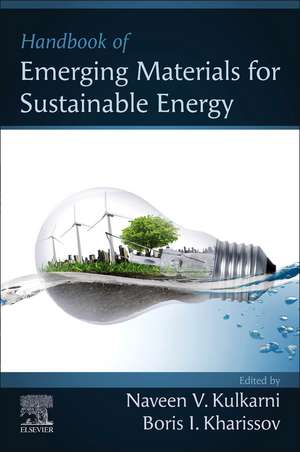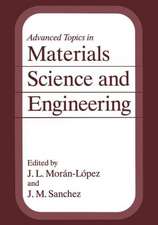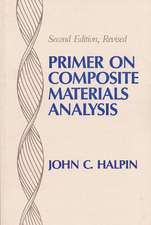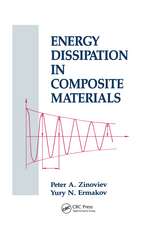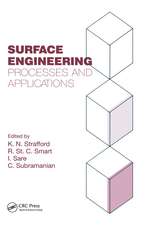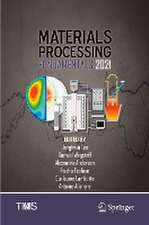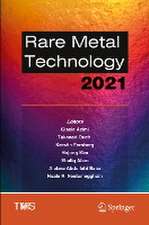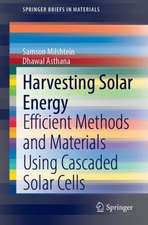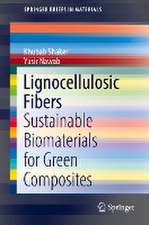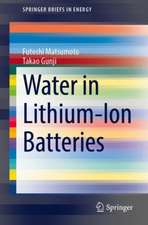Handbook of Emerging Materials for Sustainable Energy
Editat de Naveen V. Kulkarni, Boris I. Kharissoven Limba Engleză Paperback – 22 feb 2024
The book concludes with three chapters related to advanced materials under development for energy conservation and environmental protection, including theories, methodologies and simulations established for advanced materials.
- Covers a broad scope of advanced materials that have been developed for energy and environmental sustainability
- Provides detailed and updated information about the structural and functional features of various emerging materials and their multifaceted applications
- Includes supplementary data alongside each chapter
Preț: 1727.47 lei
Preț vechi: 2252.73 lei
-23% Nou
Puncte Express: 2591
Preț estimativ în valută:
330.66€ • 347.38$ • 277.88£
330.66€ • 347.38$ • 277.88£
Carte tipărită la comandă
Livrare economică 04-18 martie
Preluare comenzi: 021 569.72.76
Specificații
ISBN-13: 9780323961257
ISBN-10: 0323961258
Pagini: 1032
Dimensiuni: 152 x 229 mm
Greutate: 2.02 kg
Editura: ELSEVIER SCIENCE
ISBN-10: 0323961258
Pagini: 1032
Dimensiuni: 152 x 229 mm
Greutate: 2.02 kg
Editura: ELSEVIER SCIENCE
Public țintă
Materials Scientists and Engineers in R&D and academia working in the field of energy conversion, harvesting, energy storing and energy saving materialsUndergraduate and Postgraduate courses related to Material science.
Cuprins
Part 1: Advanced materials in battery technology
Part 2: Emerging materials in electrochemistry
Part 3: Novel materials for solar energy
Part 4: Emerging materials in photocatalysis
Part 5: Advanced materials for biofules and biohydrogen
Part 6: Materials for carbon capture
Part 7: Modern materials for energy and environmental applications
- Recent advances of nanomaterials for rechargeable lithium-ion batteries: opportunities and challenges
- Functional materials for solid-state battery applications
Part 2: Emerging materials in electrochemistry
- Supercapacitors: basics and progress
- Electrochemical capacitors: basic concepts and emerging nanomaterials for electrodes
- Nanoporous silicon materials for solar energy by electrochemical approach
- Mixed transition metal oxides for electrochemical energy storage
- Bi- and trimetallic MOFs and their MOF-derived nanocarbons in electrocatalytic water splitting processes
Part 3: Novel materials for solar energy
- Photovoltaic devices: dye sensitized and perovskite solar cells
- Photovoltaics: background and novel carbon-based materials for third-generation solar cells
- Photochromic molecules and materials: design and development
- Designing heterostructures for production of solar fuels
- Evacuated solar energy collector
Part 4: Emerging materials in photocatalysis
- Nanostructured semiconductors for hydrogen production through photocatalyatic water splitting
- Doped mixed phase transition metal oxides for photocatalysis
- Graphitic carbon nitride as a metal free photocatalyst for solar water splitting
- Lanthanide-based metal-organic frameworks as a promising visible light photocatalyst for hydrogen production
Part 5: Advanced materials for biofules and biohydrogen
- Biofuels
- Trends in valorization of biomass to biofuels: biobutanol
- Bioethanol as an alternative energy resource for a sustainability: an approach
- Biodiesel production from various nonedible plant seeds via transesterification process as an alternate feedstock
- Microalgae as a source of sustainable energy resource for biofuels: a review
- Mesoporous polymers for the catalytic conversion of biomass platform molecules to value-added chemicals
- Sustainable biohydrogen production: technoeconomic analysis
- Catalytic hydrogen generation from biomass and its derivatives
Part 6: Materials for carbon capture
- Carbon dioxide sequestration, conversion and utilization
- Carbon capture using NaCl (halite)
- Carbon capture using halite, seawater, and saline water
Part 7: Modern materials for energy and environmental applications
- Recent developments in techniques and technologies for analytical, spectroscopic, structural, and morphological characterization of modern materials of advanced applications
- Recent trends and future potential of sustainable energy efficient materials for commercial buildings
- Materials for energy-efficient systems and environmental remediation
- Chalcogenide semiconductor nanocrystals—optoelectronic applications
- Elemental semiconductor nanocrystals
- Metal oxide nanocrystals— applications
- Special modifying inorganic physical vapor deposition coatings and surface systems for sustainable energy products
- Growth of 2D boron materials
- Surface modification of metal-organic frameworks and their applications for the gas adsorption
